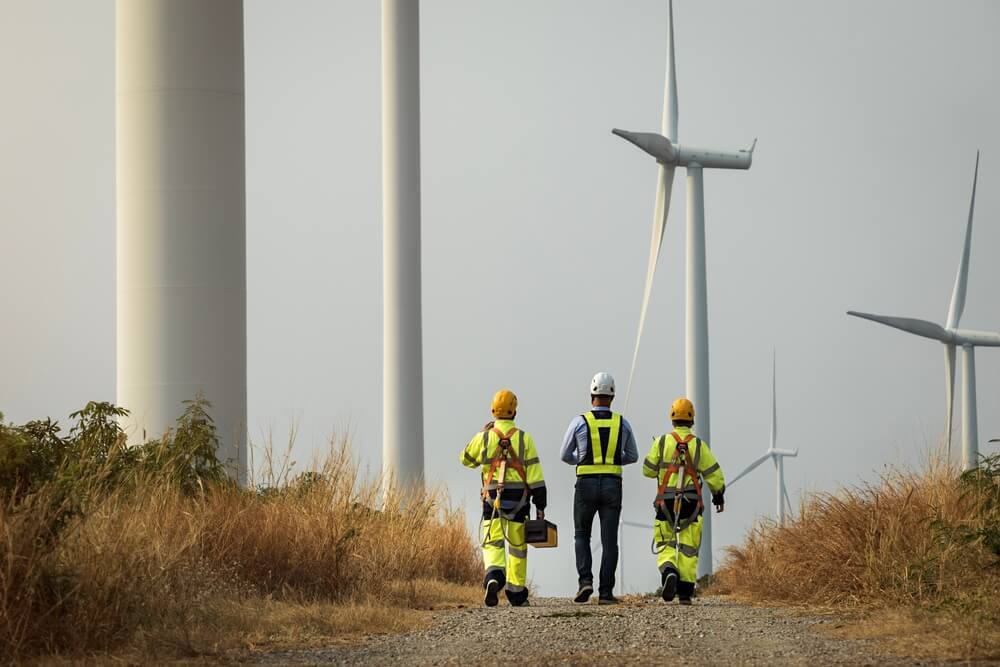TGIF, Agents of Impact!
🗣️ In a word. Each week, we select a word or phrase to tie together the news, capture the zeitgeist, and point a way forward. We kicked off 2022 with “Next chapter” to call out “templates for an egalitarian realignment.” We followed with “Bridges,” to highlight firms like Lafayette Square, Posigen and BlocPower that are building an economic bridge, as the late Harry Halloran would say, “to the world we all want.” We liked “Bridges” so much we used it again in September to showcase firms, like Prime Coalition, which, after a decade mobilizing capital for early-stage climate tech, are “bridging new climate capital gaps,” such as first-time deployments of key technologies. In October, “Swagger” captured impact investing’s newfound confidence as the GIIN’s Amit Bouri announced that the industry had surpassed $1 trillion in impact assets under management, Common Future’s Rodney Foxworth pursued a string of power-shifting acquisitions and investments, and Corey Dennard, Michael Hawthorne and Taj Eldridge launched Klean Energy Kulture to put some hip-hop into the climate movement.
After 50 weeks of words, what’s the Word of the Year? We’ll open the floor to subscriber suggestions on next Wednesday’s Agents of Impact Call (RSVP here). We already have a few nominations. How about “Deploy,” as climate action shifts from innovation to installation, with hundreds of billions in fresh public funding and incentives? Or “Ownership”? To close long-standing wealth gaps, new mechanisms this year are promoting access to ownership in housing, business and other asset classes. We could make a case for “Risk.” As crypto cratered and investors fled overvalued tech stocks, impact and community investors worked to reprice mispriced risk in municipal bonds, business and mortgage lending, and diverse-led and emerging market funds and startups. Or even “Impact” itself, as the ESG-backlash forced a fresh look at strategies that actually improve outcomes. Next week, we’ll round up some themes and chart some trends. But if you hop on The Call, you can have the final word. – Dennis Price
👋 Call No. 47: What’s The Word? Bring us your Word of the Year and share how it will guide your work in 2023. Shoot us a note (by replying to this email) and we’ll call you up on our last Agents of Impact Call of 2022. We’ll preview some of our plans for 2023 and look forward to hearing yours. Join us, Wednesday, Dec. 21 at 10am PT / 1pm ET / 6pm London. RSVP today.
🎧 Impact Briefing. Kristin Hull of Nia Impact Capital joins host Brian Walsh to talk shareholder engagement and Nia’s public markets impact strategy. Hull, a long-time Tesla investor, says Elon Musk’s Twitter escapades threaten the electric vehicle maker’s climate mission. Hull spoke to Walsh about why Nia has moved its Tesla shares into a separate activist fund, and whether it might divest altogether.
- Listen to this week’s episode, and follow all of ImpactAlpha’s podcasts on Apple, Spotify or wherever you listen.
- ICYMI. “Are Elon Musk’s Twitter escapades putting Tesla’s climate impact at risk?” by Dennis Price on ImpactAlpha.
Elsewhere on ImpactAlpha:
- Jigar Shah on building a $140 billion “bridge to bankability” for the energy transition (podcast) (David Bank)
- The case of the suddenly missing trillions in ESG investments (Amy Cortese)
- What Adasina learned about advancing “fiscal justice” by investing $60 million in muni bonds (Andrea Riquier)
The Week’s Agent of Impact
Napoleon Wallace, Southern Reconstruction Fund: Restorative capital for Black wealth. Napoleon Wallace’s presence was all over the recent Mission Investors Exchange conference in Baltimore. As the co-founder of Activest, which showcased its “fiscal justice” strategy to center racial equity in fixed-income investments. As a founding partner of Partners in Equity, which presented its $50 million fund to help Black and Brown business owners buy commercial real estate. And in the personal networks of many Agents of Impact at the conference, including Robert Wood Johnson Foundation’s Kimberlee Cornett, who credits Wallace with sparking her interest in the social impact potential of the municipal bond market (disclosure: Robert Wood Johnson Foundation supports ImpactAlpha’s coverage of Muni Impact).
But Wallace himself was not at the conference. He was in Durham, N.C., where he works from home, and from a wheelchair, as he grapples with amyotrophic lateral sclerosis, a progressive nerve disease that affects the brain and spinal cord. Wallace was diagnosed with ALS in 2019 at 38 years old. After the conference, ImpactAlpha’s David Bank flew to Raleigh-Durham to visit with Wallace, who had invited him down to share what he called “some of my more speculative thoughts.” Those included his thesis that profitable, and negative, externalities are “the core rot at the heart of our economy,” and his call for a market to “short” muni bonds to drive fiscal accountability in cities that displace residents, squander resources and pay out settlements for excessive use of force by police officers.
Wallace’s latest venture, with co-founder Dorian Burton, is the Southern Reconstruction Fund, which reaches back to the post-Civil War period of social innovation for new models of ownership and restorative capital in the American South. The organization is building from a $25 million Ownership and New Equity Fund, or FundONE, to a larger fund of funds to seed “super-early, back-of-the-napkin impact-alpha theses that are still living in the imaginations of future first-time fund managers.” As the meeting was coming to an end, David asked one last question. How does Wallace continue to work through the unfathomable challenges of his diagnosis? “It’s a gift,” he said. “I’m able to remove all the distracting elements in my life, and to focus my mind and energy on the things that matter.”
- Keep reading, “Napoleon Wallace, Southern Reconstruction Fund: Restorative capital for Black wealth,” by David Bank on ImpactAlpha, and share the story on Instagram.
The Week’s Dealflow
Deal spotlight: Plant-based versus lab-grown meat. It has been a hard year for champions of plant-based food. The economic downturn, VC slowdown and rising prices have cooled the once-frothy market for startups developing animal-free alternatives to meat, dairy and other staples. Companies making plant-based products—rather than lab-grown foods—have been hit particularly hard. Plateauing demand signals that plant-based alternatives have saturated the market of vegetarians and flexitarians, says Sophie Bakalar of Collaborative Fund. The firm was an early investor in Beyond Meat, the poster child for the movement’s meteoric rise, and then fall.
- Bucking the trend. “VC money is really scarce,” admitted Matias Muchnick, founder of NotCo, the Chile-based maker of Not Milk, Not Mayo and Not Burgers. Still, NotCo raised a $70 million Series D extension round for its AI-powered product discovery platform for animal-free alternatives. The company, which has a $1.5 billion valuation, is leaning into a business-to-business strategy as a buffer against the problem of market differentiation faced by other makers of plant-based products.
- Trillion-dollar companies. Venture capital firms appear to be leaning into lab-grown meat as the real game-changer. “There’s an opportunity to build a trillion-dollar company in the cultivated meat space,” says Seth Bannon of Fifty Years VC, which has backed Upside Foods in the U.S. Last month, Upside became the first cultivated-meat company to get product approval from the U.S. Food and Drug Administration. It and others are also now speeding toward price parity with traditional meat products. “I pinch myself,” says Bannon. “But if they want to be in McDonald’s, they’ve got a lot of work to do.”
- Keep reading, “Deal spotlight: Plant-based versus lab-grown meat,” by Jessica Pothering on ImpactAlpha.
Natural capital. HSBC-backed Climate Asset Management raised $650 million for natural capital funds… Colorado-based Mad Capital raised $4 million to finance farmers looking to transition to regenerative agriculture practices… The International Finance Corp. backed Ecuador-based Banco Internacional’s $79 million blue bond to finance sustainable fisheries and aquaculture… French startup MORFO raised €4 million to use drones for reforestation projects… Varaha scored $4 million to help smallholder farmers create nature-based carbon credits.
Women-led funds. Women-led Beyond Capital Ventures closed its second fund to invest in early-stage impact startups in India and East Africa… Nigerian fintech startup Owoafara scored early funding from gender-lens investor ShEquity to offer financial services to the unbanked… WIC Capital backed Calinounou’s home services in Senegal… Aruwa Capital backed Nigerian furniture manufacturer Taeillo to create jobs and curb imports from Europe.
Clean energy. NEW: LeapFrog Investments led a $70 million Series D extension round for off-grid solar provider Sun King… ‘Net energy’ breakthrough fuels the race to commercialize fusion power… Public Sector Pension Investment Board invested $250 million to scale up offshore wind turbine production from Norway’s Havfram and private equity firm Sandbrook Capital.
Climate finance. Rwanda is the first African country to be approved for lower-cost climate resilience debt from the International Monetary Fund’s Resilience and Sustainability Facility… Union Square Ventures raised $200 million for its latest climate fund… Avarni clinched funding to help companies track Scope 3 emissions.
Health and wellbeing. Transform Health Fund scored $50 million from investors for healthcare in Africa… Mexico-based Plenna raised $4.4 million to provide subscription-based online and in-person women’s health services… Juno Medical raised $12 million to make primary health care affordable and accessible to families in underserved communities.
Low-carbon transition. EnviroSpark raised an undisclosed amount of Series A funding to expand its network of electric vehicle charging stations in the U.S. and Canada… Gridless in Kenya raised $2 million to use hydropower to mine Bitcoin… Germany’s Customcells raised €60 million in Series A funding to make lithium-ion batteries for electric planes.
Agrifood investing. California-based Sound Agriculture secured $75 million for crop treatments that help farmers reduce dependence on synthetic chemicals.
Economic inclusion. IIX raised $50 million for its fifth Women’s Livelihood Bond… TLG Capital is partnering with two investors in Africa to lend to startups and growing businesses.
Education and skills. Uolo raised $22.5 million to provide K-12 online learning programs for low- and middle-income families in India… Acumen led Kenyan edtech startup Zeraki’s $1.8 million in a seed round to digitize school administration.
Financial inclusion. Finclusion Group raised $2 million to provide African consumers with access to credit… Moove raised $30 million in an Islamic finance-compliant bond to accelerate EV adoption in the Middle East.
The Week’s Talent
Friends and colleagues are mourning the loss of corporate responsibility and responsible investing champion Patricia Daly of the Sisters of St. Dominic of Caldwell, N.J. Daly advocated for corporations in the U.S. to adopt climate change strategies, and co-founded Campaign ExxonMobil to call out the oil giant’s climate-change track record… David Lee, who joined AppHarvest as president last year, stepped down but will remain on the company’s board.
Guild Education selected Dean Carter, ex- of Patagonia, as “Chief People Officer”… Omidyar Network recruited Bryce Covert, Kim Kelly and Edward Ongweso Jr. as “reporters in residence” to write about worker power, corporations and capital markets, and “reimagining capitalism”… BlackRock promoted its deputy chief financial officer Joud Abdel Majeid to head of investment stewardship; he succeeds Sandy Boss, who becomes chief operating officer for BlackRock’s global client business.
The U.K.’s Financial Conduct Authority named six members to a new ESG advisory committee: Desiree Fixler of RYSN Consulting and VentureESG, Sonali Siriwardena of Simmons and Simmons, Harald Walkate of the University of Zurich’s Center for Sustainable Finance and Private Wealth, Tom Gosling of London School of Business, Catherine Howarth of ShareAction, and Tim Mohin, ex- of Persefoni and the Global Reporting Initiative.
The Draper Richards Kaplan Foundation named Dallas’ police chief Renee Hall, former Superior Court judge Shelyna Brown, and Revolution Foods founder Kristin Groos Richmond as senior fellows. Mobola da-Silva, ex- of Alitheia Capital, and Karen Serem Waithaka, ex- of Global Partnerships, joined the foundation as Africa portfolio advisors… Aisha Francis of Benjamin Franklin Cummings Institute of Technology joined Sunwealth’s board of directors.
And happy birthday to ImpactAlpha’s own Dennis Price, who celebrates this weekend.
The Week’s Jobs
Ares Management Corp. is hiring an ESG associate and an ESG analyst in New York… Also in New York, the Guggenheim Museum is recruiting a sustainability associate director, and the Moinian Group has an opening for a sustainability director… Trust for Public Land is looking for a remote climate project manager… The U.N. Foundation is hiring a sustainability development program manager for Latin America and the Caribbean, based in Washington, D.C.
Boston Consulting Group seeks a project leader and principal of climate and sustainability… EYElliance is seeking a remote senior manager for sustainable financing… The Global Alliance for Green and Gender Action is hiring a communications strategist… World Resources Institute is recruiting a strategy director for responsible supply chains… The ImPact is hiring a catalytic capital senior associate for Trimtab, an impact-first fund of funds that The ImPact is incubating with Blue Haven Initiative.
That’s a wrap. Have a wonderful weekend.
– Dec 16, 2022











